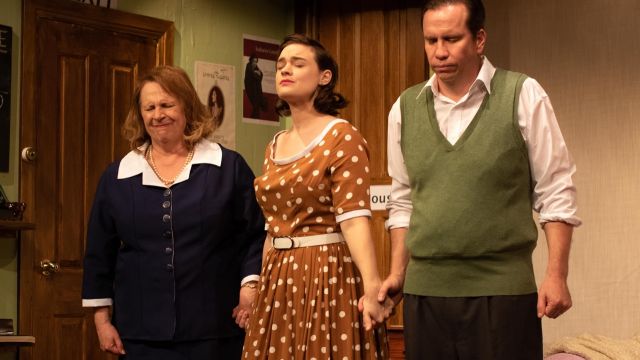Moon Over Buffalo
In Buffalo, New York, George and Charlotte Hay are fading stars of the 1950s, just surviving with repertory theatre productions of "Cyrano de Bergerac" and "Private Lives". Their finances and marriage are on the rocks and their only daughter is about to get married to someone who isn’t in show business.
This 1995 American farce was originally a Broadway showcase for the stage return of Carol Burnett, but its roots are in British comedy: slapstick, confusion, characters having secret dalliances and constantly avoiding each other on stage.
Tea Tree Players know what their audiences like and opening night had the crowd laughing a lot. The main reason for this was Andrew Crayford’s performance. As George Hay, he has a wonderful physicality that brings laughter just by his being there, without saying a word. His Rowan Atkinson-like contortions when he’s drunk are hilarious and he throws himself around the stage for the whole play (sometimes literally).

Chris Galipo is Charlotte, reprising her role from the company’s 2005 production, and she gives a balance of surprise and indignation with energy. Stacey Murray is great as Rosalind, the couple’s daughter; she has the right amount of stiffness when trying desperately to escape treading the boards, then an equal measure of silkiness when on the stage-within-a-stage – and all the time, retaining a half-decent accent throughout. However, her eagerness in how she switches from distance to intimacy jars with her otherwise good characterisation.
Cathie Oldfield plays deaf and shouts at George a lot in her role as his mother-in-law. Her part in sowing confusion amongst the others is on the whole, well underplayed. Kieran Drost’s Howard is appropriately clueless and dreary and Kahlia Feuerreiter’s Eileen weeps through the consequences of her ‘one night stand’ with the leading man.
David Kinna’s Paul, the stage manager and Rosalind’s ex, does his best to hold the mania together, and the lawyer Richard, played here by Stephen Prior, is suitably dull but slimy.
Robert Andrews takes on lighting and sound design, which are functional, as well as set design, which is more impressive. The separation of the stage and backstage of the play’s theatre is well done and the many entrances and exits perfect for this farce. Jo Allenby directs her cast through these doorways confidently and it’s a credit to the director and performers that they always seem to appear in the right place every time. It was sometimes confusing to see someone leave by one door and appear through another, but that suggestion of a rabbit warren within the theatre is certainly realistic.
The story itself is typical for farce: there’s a philandering husband trying to cover-up his affair with a younger woman, then his wife trying to leave him and her mother in between them, ensuring her own misunderstandings are well-communicated to the others.
 The choices of “Cyrano de Bergerac” and “Private Lives” as the two repertory plays are sketchy nods to the dynamics of this ensemble, but the realisation of snippets of these two dramas are admirable – I especially loved the set for the Noël Coward scene.
The choices of “Cyrano de Bergerac” and “Private Lives” as the two repertory plays are sketchy nods to the dynamics of this ensemble, but the realisation of snippets of these two dramas are admirable – I especially loved the set for the Noël Coward scene.
The first act bounces along at a decent pace, revealing the motivations for each of the characters’ choices and setting it up for the second act without the end result being too obvious. The first scene in the second act is messy – the pieces hurriedly put into place for the next couple of scenes, which are the funniest in the play, thanks to Crayford’s performance as a drunk and his rubbery body.
The wrap-up is unsatisfyingly clean, with everyone gaining a conclusion if not appropriate redemption. These writer’s flaws are given a light touch by Allenby and her cast with the audience laughing too much to realise.
But everyone is having a lot of fun here – the cast and audience alike – and Tea Tree Players won’t disappoint in giving you a chuckle.
Mark Wickett
Subscribe to our E-Newsletter, buy our latest print edition or find a Performing Arts book at Book Nook.

